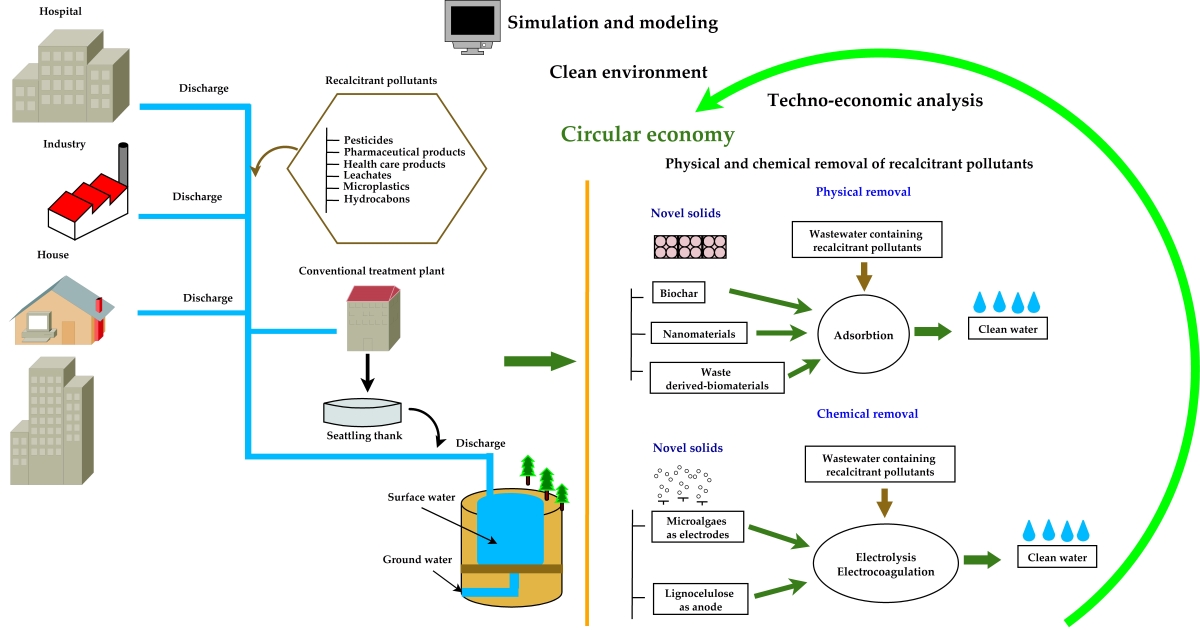- 2.8Impact Factor
- 5.5CiteScore
- 15 daysTime to First Decision
Physical and Chemical Removal of Recalcitrant Pollutants Using Novel Solids: Nanomaterials, Biochar, and Waste-Derived Biomaterials
This special issue belongs to the section “Environmental and Green Processes“.
Special Issue Information
Dear Colleagues,
In recent years, wastewater has become a globally recognized issue, particularly in terms of its recalcitrant pollutants. As a result, new innovative physical and chemical technologies have been developed to promote water and sanitation cleanliness in line with circular economy principles.
Processes invites you to submit original research and critical review articles for publication in the “Physical and Chemical Removal of Recalcitrant Pollutants Using Novel Solids: Nanomaterials, Biochar, and Waste-Derived Biomaterials” Special Issue, after peer review.
This Special Issue will cover the sustainable physical and chemical removal of recalcitrant pollutants, including topics such as new and innovative nanomaterials, novel biochar, innovative uses of waste-derived biomaterials, circular economy promotion, reduction in fossil-derived plastics and waste-derived biomaterials, simulation, modeling, and techno-economic analyses.
Prof. Dr. Alejandro Regalado Méndez
Dr. Reyna Natividad
Prof. Dr. Rubi Romero
Guest Editors
Manuscript Submission Information
Manuscripts should be submitted online at www.mdpi.com by registering and logging in to this website. Once you are registered, click here to go to the submission form. Manuscripts can be submitted until the deadline. All submissions that pass pre-check are peer-reviewed. Accepted papers will be published continuously in the journal (as soon as accepted) and will be listed together on the special issue website. Research articles, review articles as well as short communications are invited. For planned papers, a title and short abstract (about 250 words) can be sent to the Editorial Office for assessment.
Submitted manuscripts should not have been published previously, nor be under consideration for publication elsewhere (except conference proceedings papers). All manuscripts are thoroughly refereed through a single-blind peer-review process. A guide for authors and other relevant information for submission of manuscripts is available on the Instructions for Authors page. Processes is an international peer-reviewed open access semimonthly journal published by MDPI.
Please visit the Instructions for Authors page before submitting a manuscript. The Article Processing Charge (APC) for publication in this open access journal is 2400 CHF (Swiss Francs). Submitted papers should be well formatted and use good English. Authors may use MDPI's English editing service prior to publication or during author revisions.
Keywords
- new and innovative nanomaterials
- novel biochar
- physical removal
- chemical removal
- waste-derived biomaterials
- circular economy
- reduction in fossil-derived plastics
- reduction in waste-derived biomaterials
- simulation and modeling
- techno-economic analysis

Benefits of Publishing in a Special Issue
- Ease of navigation: Grouping papers by topic helps scholars navigate broad scope journals more efficiently.
- Greater discoverability: Special Issues support the reach and impact of scientific research. Articles in Special Issues are more discoverable and cited more frequently.
- Expansion of research network: Special Issues facilitate connections among authors, fostering scientific collaborations.
- External promotion: Articles in Special Issues are often promoted through the journal's social media, increasing their visibility.
- Reprint: MDPI Books provides the opportunity to republish successful Special Issues in book format, both online and in print.


